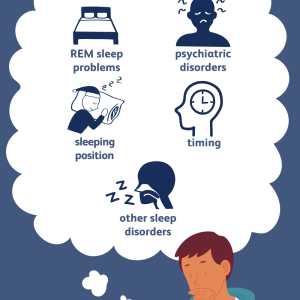Understanding Sleep Paralysis
Sleep paralysis is a phenomenon that occurs when a person is temporarily unable to move or speak while falling asleep or waking up. It is often accompanied by a feeling of pressure on the chest and a sense of impending danger or doom. This experience can be frightening, but it is usually harmless and temporary.
Causes of Sleep Paralysis
Several factors can contribute to the occurrence of sleep paralysis, including:
1. Disrupted Sleep Patterns
Sleep paralysis is more likely to occur when sleep patterns are disrupted, such as when someone is sleep deprived or experiencing jet lag. Changes in sleep schedule or irregular sleep patterns can increase the risk of experiencing sleep paralysis episodes.
2. Stress and Anxiety
High levels of stress and anxiety can also trigger sleep paralysis. When the body is under stress, it can disrupt the normal sleep cycle and increase the likelihood of experiencing episodes of sleep paralysis.
3. Sleep Disorders
Certain sleep disorders, such as narcolepsy, can increase the risk of experiencing sleep paralysis. Narcolepsy is a neurological disorder characterized by excessive daytime sleepiness and sudden attacks of sleep.

Symptoms of Sleep Paralysis
The main symptom of sleep paralysis is the inability to move or speak while falling asleep or waking up. Other common symptoms include:
- A feeling of pressure on the chest
- Sensations of choking or suffocation
- Hallucinations, such as seeing or hearing things that are not there
- A sense of impending danger or doom Explore More About (Swelling Ankles)
Coping with Sleep Paralysis
While sleep paralysis can be a frightening experience, there are several strategies that can help cope with and prevent episodes:
1. Improve Sleep Hygiene
Maintaining a regular sleep schedule and practicing good sleep hygiene can help reduce the likelihood of experiencing sleep paralysis. This includes going to bed and waking up at the same time each day, avoiding caffeine and electronic devices before bedtime, and creating a comfortable sleep environment.
2. Manage Stress
Finding healthy ways to manage stress and anxiety can also help reduce the frequency of sleep paralysis episodes. This may include relaxation techniques such as deep breathing, meditation, or yoga.
3. Seek Treatment for Underlying Conditions
If sleep paralysis is occurring frequently or causing significant distress, it may be a good idea to seek treatment for any underlying sleep disorders or mental health conditions. A healthcare professional can provide guidance and support tailored to individual needs.

When to Seek Help
While sleep paralysis is usually harmless, it can sometimes be a sign of an underlying sleep disorder or other medical condition. It is important to seek medical attention if:
- Episodes of sleep paralysis are occurring frequently or causing significant distress
- Sleep paralysis is accompanied by other symptoms, such as excessive daytime sleepiness or sudden muscle weakness
- Sleep paralysis is interfering with daily functioning or quality of life
Coping Strategies for Sleep Paralysis
| Coping Strategies | Description |
|---|---|
| Improve Sleep Hygiene | Maintain a regular sleep schedule, avoid caffeine and electronic devices before bedtime, create a comfortable sleep environment |
| Manage Stress | Practice relaxation techniques such as deep breathing, meditation, or yoga |
| Seek Treatment | Consult with a healthcare professional for underlying sleep disorders or mental health conditions |
Conclusion
Sleep paralysis is a common phenomenon that can occur when falling asleep or waking up. While it can be frightening, it is usually harmless and temporary. Understanding the causes and symptoms of sleep paralysis, as well as implementing strategies to cope with and prevent episodes, can help individuals manage this experience more effectively. If sleep paralysis is occurring frequently or causing significant distress, it is important to seek medical attention to rule out any underlying medical conditions. With proper management and support, individuals can learn to navigate sleep paralysis and improve their overall sleep quality and well-being.









